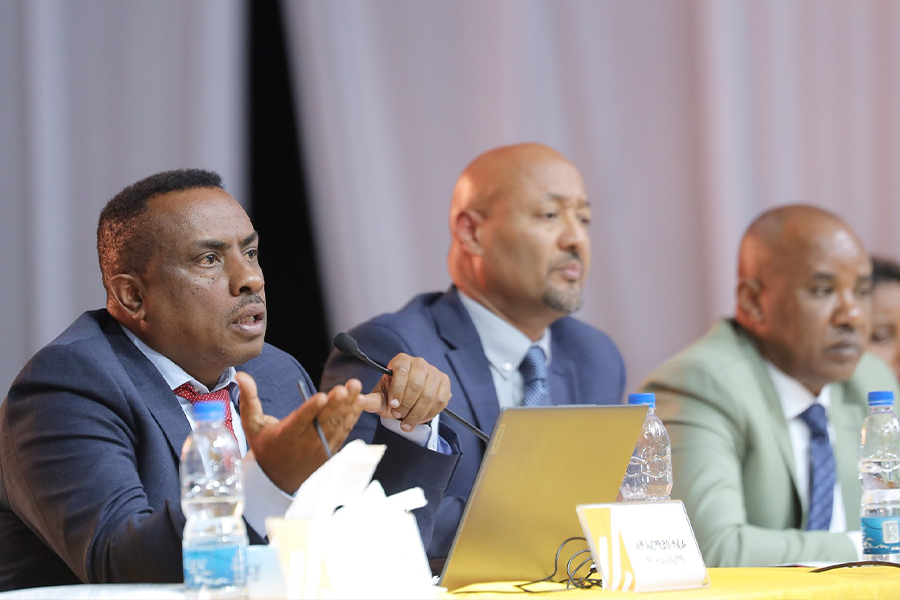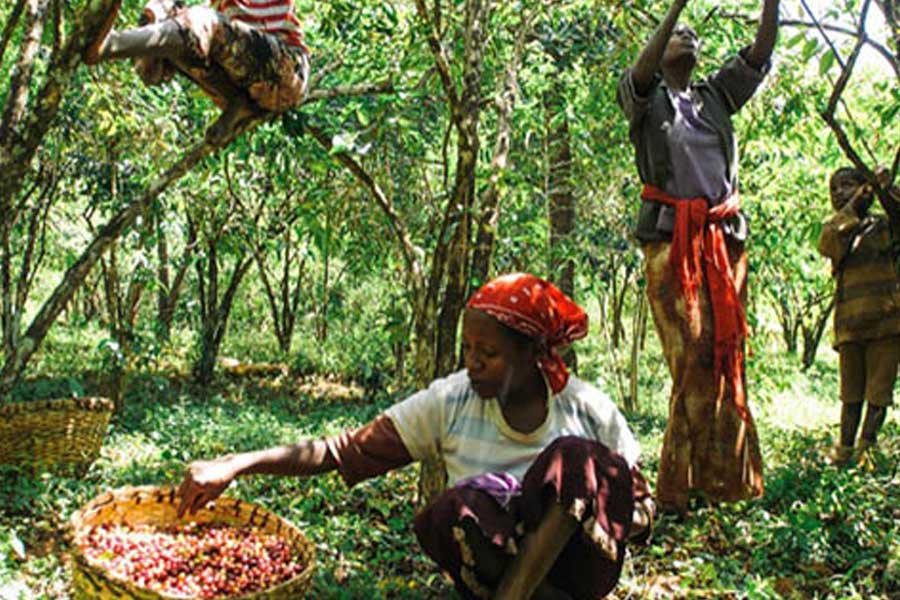
The authorities are scrambling to comply with the European Union’s forthcoming regulation on deforestation, a move that threatens a significant portion of coffee exports to the economic bloc. The Ethiopian Coffee & Tea Authority (ECTA), under the Director General, Adugna Debela (PhD), is spearheading a national action plan estimated to cost 2.2 billion Br to meet the stringent European requirements.
The regulation, which aspires to curb deforestation by ensuring imported commodities do not contribute to forest degradation, is poised to affect a third of Ethiopia's coffee exports.
Coffee is the spine of Ethiopia's economy, with the country earning 1.4 billion dollars in exports last year. However, the coffee sector experienced a downturn in the fourth quarter of last year, with revenues falling by 17pc and volume dropping 15.4pc to 78,000tns. The decline in export performance is attributed to various factors, including fragmented land holdings among smallholder coffee farmers, poor data management, and the looming cost of compliance with EU regulations.
The EUDR, set to be enforced in less than a year, mandates that suppliers adhere to labour and human rights laws, including the rights of indigenous communities. A consequential aspect of the regulation is the requirement for due diligence statements establishing that commodities, such as coffee, have not contributed to deforestation since December 2020. The potential sanctions for non-compliance include fines of up to four percent of a company's annual turnover, confiscation of goods, and temporary bans from participating in EU procurement or tenders.
Adugna's action plan, unfolding over the next three years, includes seven strategic targets designed to ensure compliance with the EUDR.
"It's time for compliance, not complaints," said Adugna, pressing the urgency during last week's meeting at the Skylight Hotel on Africa Avenue (Bole Road). "Farmers can only ask how they could benefit from subscribing to the requirement."
A national steering committee has been established, comprising representatives from various federal agencies and ministries, the Coffee & Tea Authority, the Geospatial Institute, regional agriculture bureaus, coffee growers, and exporters. It wants to compile a national database up to the Wereda (district) level. Significant investments in digital assets, including laptops, GPS devices, smartphones, and training programs for farmers and exporters, are on the table.
Gizat Worku is a general manager of the Ethiopian Coffee Exporters Association, a powerful industry lobby group. Although he was hoping for more private sector participation in its drafting, he is relieved with an action plan which exhibits a professional touch. However, he urged the importance of understanding how Europeans would react to the challenges Ethiopia faces, pinning hopes on the georeferencing of Ethiopian coffee to address the impact.
"It depends on how the Europeans react now," he said.
The European Commission estimates compliance-related costs for companies to range between 170 million dollars and 2.5 billion dollars annually. Continued appeals are made, and objectives to begin the risk assessment process by March are outlined.
According to Umar Shafi, deputy director of the Authority, cooperation along the entire coffee supply chain to safeguard Ethiopia's interests in the face of EU regulations is essential.
"All participants in the coffee supply chain will rally together," he told Fortune.
However, the authorities worry that mapping the 5.2 million coffee farmers within the EU's timeframe is daunting, particularly given the unique nature of coffee cultivation, which predominantly occurs in forested areas. The EUDR’s geolocation requirements, which demand a polygon survey for plots larger than four hectares and a point reference for smaller plots, complicate compliance efforts. Over 85pc of coffee is farmed on plots around half hectares, demonstrating the complexity of meeting these standards.
Experts from the Geospatial Institute suggest validating existing satellite maps and aerial photographs to meet the EU's geolocation demands. The Institute is considering launching a project to verify the available data through onsite surveys, acknowledging the difficulties of accurately mapping large expanses of land in the short timeframe available for compliance.
Tesfaye Dagne, lead executive of digital image processing, asserted that accurately mapping large expanses of land in a short time would be nearly impossible.
"We've some recent images at our disposal," he told Fortune.
As Ethiopia races against time to comply with the EUDR, the outcome of its efforts is seen as an opportunity to demonstrate its leaders' commitment to sustainable coffee production and forest conservation.
Motuma Tolera (PhD), deputy director of the two-year-old Ethiopian Forestry Development, said it creates an opportunity to bring attention to the country's forest. Despite finalising a project to illustrate Ethiopia's forest cover in the coming few months, Motuma acknowledged the difficulty in georeferencing even flagship ambitions, such as the initiative set off by Prime Minister Abiy Ahmed (PhD) to plant nearly 50 billion trees across Ethiopia by 2025.
"It has also been a challenge for Green Legacy," he said.
Mapping inaccuracies, such as coordinates erroneously pointing to the ocean in a project with a Scandinavian country, exposed the difficulties Ethiopian technicians face in providing accurate data.
Zerihun Getu serves as a coordinator for the Ministry of Finance's initiative on climate-resilient green economy. He has decades of expertise in restoring degraded landscapes and forestry management. He warned that sensitivity to mapping farm areas could lead to disputes between European buyers and Ethiopian suppliers if inaccurate data is presented.
"A slight change in weather patterns could skew readings," said Zerihun.
Despite these hurdles, there is a sense of optimism among market participants. The coffee industry, characterised by its forest-grown coffee, is expected to be low-risk under the EUDR due to its significant concentration of forest coffee. This could address the potential economic fallout from the regulation. However, the critical nature of accurate geolocation and registration remains a primary concern, according to Zerihun.
While the probability of deadline extensions is waning, some are pleading for any adjustment from the buyers' side.
Director General of Sidama Coffee, Fruits & Spices Development, Mesfin Kare, insisted on finding ways to look for an extension period. He said adequately evaluating the risk exposure is a massive campaign, including removing the Eucalyptus tree, locally known as 'Baher Zaf', over the three-year-old Sidama Regional State, which poses some risk.
"A few years grace period will be helpful - enormously," he said.
PUBLISHED ON
Feb 03,2024 [ VOL
24 , NO
1240]

Radar | Oct 23,2021

Radar | Aug 14,2021

Radar | Jul 01,2023

Radar | Aug 21,2021

Viewpoints | Sep 28,2019

Radar | Mar 19,2022

Radar | Dec 16,2023

Radar | Jun 14,2020

Fortune News | Dec 19,2020

Radar | Nov 21,2018

Dec 22 , 2024 . By TIZITA SHEWAFERAW
Charged with transforming colossal state-owned enterprises into modern and competitiv...

Aug 18 , 2024 . By AKSAH ITALO
Although predictable Yonas Zerihun's job in the ride-hailing service is not immune to...

Jul 28 , 2024 . By TIZITA SHEWAFERAW
Unhabitual, perhaps too many, Samuel Gebreyohannes, 38, used to occasionally enjoy a couple of beers at breakfast. However, he recently swit...

Jul 13 , 2024 . By AKSAH ITALO
Investors who rely on tractors, trucks, and field vehicles for commuting, transporting commodities, and f...

Oct 25 , 2025
The regulatory machinery is on overdrive. In only two years, no fewer than 35 new pro...

Oct 18 , 2025
The political establishment, notably the ruling party and its top brass, has become p...

Oct 11 , 2025
Ladislas Farago, a roving Associated Press (AP) correspondent, arrived in Ethiopia in...

Oct 4 , 2025
Eyob Tekalegn (PhD) had been in the Governor's chair for only weeks when, on Septembe...